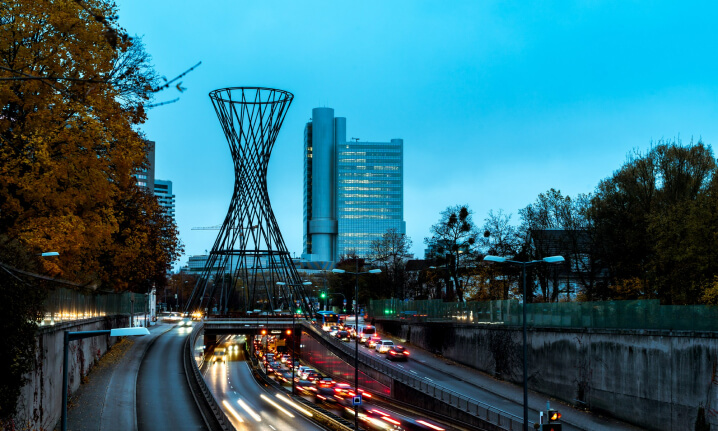About Germany

Germany, situated at the heart of Europe, embodies a blend of tradition and modernity, offering a multifaceted experience for residents and visitors alike. With its thriving cities, picturesque landscapes, and rich cultural heritage, Germany captivates with its diversity and charm. Renowned for its strong economy and technological advancements, Germany serves as a global leader in innovation and sustainability. From the historic streets of Berlin to the scenic beauty of the Bavarian countryside, Germany invites exploration and discovery at every turn. With a rich history dating back centuries, Germany’s cultural landscape is alive with dynamic festivals, world-class museums, and architectural marvels. Whether indulging in hearty cuisine or delving into the arts, Germany’s welcoming atmosphere and inclusive spirit create an unforgettable experience for all who venture here.
Germany is a developed nation, renowned for its high standard of living and productive society. With a robust social security system, universal healthcare, and tuition-free university education, it prioritizes the well-being and education of its citizens. As a founding member of the European Union and the Eurozone, and a part of the Schengen area, Germany has significant influence in global affairs. Its active participation in international organizations such as the United Nations, NATO, the G8, the G20, and the OECD underscores its role as a key player on the world stage. Additionally, Germany’s rich cultural history continues to shape the world through its influential contributions in various fields, including arts, philosophy, science, and sports.


Germany, situated in North-Central Europe, boasts diverse geography over its 357,022 square kilometers. The landscape includes tall mountains in the south, sandy plains in the north, forested hills in the west, and farmland in the east. The northern coast is flat, while the Baltic Sea coast features fjords and cliffs. Plateaus and deep river valleys divide the country, with small mountain ranges like the Harz and Taunus. The southwest is marked by escarpments, fertile lowlands, and the famous Black Forest.

Germany's diverse climate is shaped by its position between oceanic Western European and continental Eastern European climates, resulting in a blend of influences across the country. Dominated by temperate seasonal conditions, with distinct spring, summer, autumn, and winter seasons, Germany experiences mild winters and cool summers in regions influenced by the North Atlantic Drift, such as the northwest and north. In contrast, the eastern parts exhibit a more continental climate with colder winters and warmer summers. Central and southern regions serve as transition zones, showcasing varying degrees of oceanic and continental climates. Additionally, the Alpine regions in the south and certain areas of the Central German Uplands feature mountain climates, characterized by lower temperatures and higher precipitation levels. Overall, Germany's climate diversity offers a range of experiences, from mild oceanic conditions to more extreme temperatures, providing a rich tapestry for residents and visitors to explore.

Germany houses the world's fourth-largest economy, following the USA, China, and Japan, with a demand for skilled workers to spearhead the energy transition and promote environmental sustainability. The nation excels with a sturdy industrial ecosystem notably in automotive, mechanical engineering, chemicals, and electrical industries, home to globally recognized corporations. Germany's reputation for quality and engineering prowess is evident through its prolific patent registrations and flourishing startup ecosystem. The highly skilled workforce is a pillar of the country's economic strength. Germany places significant emphasis on research and development, with substantial investments from both corporate and academic sectors. Export-oriented, with over 50% of its economy driven by sophisticated industrial products, Germany's economic landscape is also characterized by the substantial contribution of small and medium-sized enterprises, constituting a lion's share of the businesses, including numerous global market leaders.

Germany features a highly developed transportation network that has a pivotal role in the development of the economy. Positioned at the heart of the continent, its strategic location has made it a crucial hub for land, air, and water transportation, handling substantial traffic volumes. Its modern and dense infrastructure includes controlled-access autobahns, high-speed trains, efficient rapid transit systems, and a diverse array of public transportation options. Despite such extensive offerings, Germany remains deeply entrenched in a culture that values private car ownership, bolstered by its renowned engineering prowess. This preference for personal vehicles extends even to the younger generation, including urban dwellers, underscoring the nation's enduring affinity for automobiles. With approximately 48 million passenger cars traversing its roads, Germany stands as the leading hub for automotive activity within the European Union.

The recent developments show that Germany remains in its commitment to sustainable infrastructure and energy transition with a focus on ambitious plans and sizeable investments. The Latest studies indicate that approximately EUR 370 billion is required for the maintenance and expansion of infrastructure facilities like rail networks and roads in urban areas, districts, and municipalities by 2030. Moreover, the German government envisages plans to meet 80% of its electricity demand, estimated at around 500 to 600 TWh, from renewable energy sources by 2030. Looking ahead, the country is adamant in its goal of achieving a carbon-free energy sector by 2035 and extending this to all other sectors of the economy by 2045. To materialize these objectives, significant annual investments exceeding EUR 20 billion are expected in the energy sector until 2045. Germany's prudent initiatives reiterate its role as a global leader in sustainable infrastructure development and energy transition.

Germany is one of the must-see tourist attractions in the world. The majority of tourists are attracted by its natural beauty, history and culture. The Bavarian Alps, the Black Forest, and the Rhine Valley entice holidaymakers, while Neuschwanstein—a palace with enchanting landscapes commissioned by King Ludwig II—draws in tourists. City travellers often unwind in Hamburg enjoying art, culture and special events at the opera. The Cologne Cathedral in Germany is an iconic monument of German Catholicism, which is also a world heritage site. It is one of the oldest pilgrim sites in Northern Europe. Capital city Berlin, Baltic Islands, City of Bamberg are the other tourist spots in Germany. Altogether, the historical sites, cultural diversity and delicious German food make international tourists choose Germany as a tourist haven.

95% of the people in Germany speak German and it has around 85 million non-native speakers worldwide. Every region in Germany has its dialect and people speak in the dialect of their region. Standard German, Low German, Bavarian German and Swiss German are some of the variations of the German language. However, it is better to learn standard German as it is the commonly accepted German dialect.
In Germany, the onus of determining the education policy is on the states. Students will have different curricula in different regions. The school system also will differ from region to region. The German school system is defined as;
Grundschule: Grundschule is the primary school system where six-year-olds step into their education, which covers the first four grades. At the end of the course, based on the academic performance of a student, the teacher and parent decide which secondary school the student has to be admitted to.
Weiterführende Schulen: This denotes the secondary school system which covers Hauptschule (secondary general school for grades 5 to 9 or 10), Realschule (Practical secondary school for 5 to 10), Gymansium (Academic secondary school for grades 5 to 12 or 13), Gesamptschule (Comprehensive school for grades 5 to 12 or 13)
Hauptschule and Realschule: Those who have graduated from either the Hauptschule or Realschule are qualified for vocational training or have the option to get transfer to Sekundarstufe II/Oberstufe (equivalent to sixth form) at a Gymnasium or Gesamtschule.
Gesamtschule: A combination of Hauptschule, Realschule and Gymnasium, this category of education stands as an alternative to the tripartite school system.
Gymnasium: After 12 or 13 grade students appear for the Abitur examination. Successful students can graduate from secondary school with a certificate of advanced secondary education allowing them to undergo studies at a university.
The Interactive Web of Academia, Research & Industry
Academia, research, and industry in Germany constitute a tightly integrated network, spurring innovation and economic growth. Collaboration among universities, research institutions, and industry partners facilitates the exchange of ideas, talent, and resources, fueling success in science, engineering, and business. This interconnected ecosystem marks Germany's position as a global leader.
Academic Standards
Germany's academic standards are renowned for their rigor and excellence. Higher education institutions prioritize quality assurance and adhere to strict criteria set by accrediting bodies. The country's dual education system integrates practical training with academic learning, producing graduates with valuable theoretical knowledge and practical skills.
Funding of Research
Research funding in Germany aims to bolster the development of new ideas and technologies, covering basic research, innovative technologies, and structural research funding. Numerous organizations in Germany actively support international researchers and academics in their endeavors fostering cross-cultural collaboration and knowledge exchange on a global scale.
Courses offered in English and the international recognition of qualifications
Germany offers diverse English-taught courses, welcoming international students. Its globally recognized universities provide credibility to students' credentials, offering them challenging career opportunities worldwide. This reaffirms Germany's commitment to inclusive education, ensuring graduates' qualifications are respected internationally.
No Tuition fees and living costs
German public universities offer tuition-free learning to all students irrespective of nationality. Also, the living cost is low in comparison with other European countries. Germany believes that free access to quality education will support economic growth of the country.
